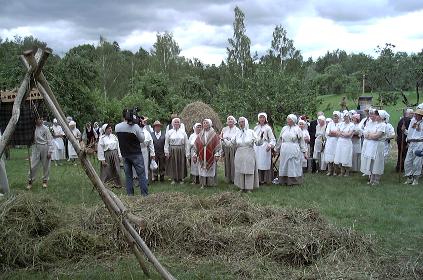|
|
|
|
|
Folklore groups
Instruments Activities About us |
|
|
|
Calendar
Regular Reportings Education |
|
|
|
Support
Fonts Mpeg3 Links Addresses Statistics Guestbook |
|
|
|
You are visitor of folklora.lt and visitor of this page. |
|
Folklore festival "Baltica", Riga, Turaida and Latgalia,
Before Baltica I have planed to write many reportings from different
concerts of the festival, however, after the festival I have understood,
that I have apprehended it all in all, and it is almost impossible to divide
the impressions.
The third day began by street concerts in Sigulda, and then
has moved to Turaida, where passed performances of folklore theatres and
hay joint-works from different areas of Latvia (hay and milk was a motto
of the festival). At evening was a concert of dances, after which on
the same place began a bigconcert. At the first part of the concert Latvian
ensembles in archeological clothes have shown a ritual of offering. At the
second part foreign ensembles performed. During the concert some nice details
have pleased: the well made fire, which, lightened from above, have burned
during all the concert, a cart of hay, passed on the hill in the background
of the scene etc. After the concert there were dances, but at half past one them,
unfortunately, have dispersed. However, excepted this incident, this day
of the festival was the most successful: maybe because of the large number
of participants (some of them was not able to arrive to all the days), maybe -
because of the beautiful place, or maybe - because of the succesfull concert.
In the festival interesting foreign groups has participated:
Armenian dancing collective of a very good level (Sasun), Polish dancing
ensemble with two staffs (youth and older people) (Sadeczane), Finnish dancers (Ahjola tanhuaiat),
Italian orchestra of panpipes (Picett del Grenta), English dancers-fools (The Chameleonic Morris Men), Norwegian youth
dancing ensemble (Smajondolenes dansarlag), Setu singers from Tartu (Liinats'uraq), united brigade of young Estonian
folklorists (Sinimaniseele), already known in Latvia Lithuanian band Duja, Russian
girls from Petersburg conservatory (sang well, but ours
Iljinskaja pjatnica
was better), very mighty both in singing, in playing, and in dancing Ukrainian
trinity of ensembles (Drevo, Volodar', Gurtopravcy), and also Latvian ensembles from England and USA.
Unfortunately ensembles of small nations were not so qualitative: in songs
Navajo Indian women (Chinle Valley Singers) were some English words ("far away"), and the dresses
were sewed from American flags and synthetics with flowers (it looks that
Indians are very practical people); Ains in general seem counterfeit -
they talked Japanese and also were dressed in Japanese kimonos.
Article: Ansis Ataols Bērziņš, 18 July 2003 |
|
Questions, comments and suggestions are welcome to ansis_N@N_folklora.lt This page is created with support of SFL, Latnet and Lanet. |
|
03 September 2018 |


